The International Accreditation Council for Clinical Research & Education (IACCRE) is a globally recognized accreditor that promotes quality and high standards in clinical research education. IACCRE accredits professional certificate programs in clinical research offered by colleges, schools, and institutes of clinical research worldwide.
IACCRE’s accreditation activities aim to serve the interests of students, the institutions offering clinical research certificate programs, the clinical research field, regulatory bodies, and the general public. Accreditation provides external peer review and verification that a program meets established standards for quality education that prepares graduates to practice competently and ethically.
This document summarizes IACCRE’s key policies and procedures for accrediting certificate programs in clinical research. Topics span IACCRE’s scope of recognition, accreditation eligibility criteria, the standards development process, directory of accredited programs, reference to accreditation status, types of accreditation decisions, reporting requirements, fees structure, record-keeping practices, and more.
Scope of Recognition
IACCRE is recognized by the biopharmaceutical industry as an accreditor of professional certificate programs in clinical research. This recognition helps accredited programs establish eligibility for participation in industry-funded educational and career development programs.
IACCRE’s scope is focused solely on voluntary accreditation of certificate programs designed to prepare individuals for careers in clinical research. Accreditation activities center on assessing the quality and continuous improvement of a program’s curriculum, faculty, resources, policies, student achievement outcomes, and other dimensions related to its educational mission.
IACCRE does not accredit diploma programs or certifications for individual students or practitioners. The Council’s recognition by industry establishes certificate program eligibility for external support opportunities, but does not confer automatic eligibility for graduates to participate in specific career development programs.
Eligibility Requirements for IACCRE Accreditation
For a professional certificate program to be eligible for IACCRE accreditation, it must meet basic criteria:
- The program must be offered by a college, school, or institute of clinical research that is part of an incorporated, legally authorized postsecondary institution.
- The parent institution must have accreditation from a regional or other agency recognized by the biopharmaceutical industry.
- The program must have a Dean responsible for administrative and academic leadership.
- The parent institution’s chief executive officer must invite IACCRE to conduct an accreditation evaluation.
These requirements help ensure the program operates within a higher education setting with appropriate oversight structures capable of supporting a quality educational experience. Regional, institutional accreditation of the parent organization provides a foundation for assessing general governance, operations, finances, facilities, and resources.
IACCRE’s voluntary, peer-review processes for accreditation build upon this base to examine the specific clinical research program’s curriculum, teaching, research training, student services, program evaluation, continuous improvement efforts, and other essential components of high caliber professional education.
Assistance to Institutions and Programs Seeking Accreditation
IACCRE staff are available to provide information and guidance to institutions and programs interested in or engaged in the accreditation process. Services include:
- Explanations of accreditation standards, policies and procedures
- phone and in-person discussions
- review of draft accreditation self-study materials
- site visits to the program
- presentations at IACCRE’s office
In addition, IACCRE collaborates with other professional societies and organizations to promote sound educational policies and practices that advance clinical research education.
This assistance is aimed at helping programs prepare for and navigate the accreditation process successfully. Consultation typically involves clarifying requirements, offering suggestions for conducting an effective self-study, and sharing strategies for demonstrating adherence to standards based on practices at other accredited programs.
Development, Review and Revision of Accreditation Standards
IACCRE maintains rigorous, up-to-date standards that accredited clinical research certificate programs must meet. The accreditation standards address essential dimensions of quality professional education, covering:
- Institutional setting, resources and oversight
- Program mission, planning, evaluation and improvement
- Curriculum and teaching methods
- Faculty recruitment, development and policies
- Student services, admissions, and academic policies
- Student achievement measures
Standards development is an iterative, collaborative process. IACCRE reviews and revises its accreditation standards approximately every 6-7 years. This formal review process involves:
- Multi-year timeline with input from accredited programs, professional societies, regulatory bodies, students, and the public.
- Multiple comment periods to gain stakeholder feedback.
- Incorporation of advances in clinical research practice and education.
- Adoption of revised standards with future effective date.
If the need for new or updated standards is identified between the periodic formal reviews, IACCRE initiates action within 12 months to make appropriate changes through the same multi-stakeholder process.
Notification of any proposed changes is provided well in advance to allow accredited programs time to adjust and come into compliance prior to the effective date. IACCRE staff and evaluation teams are comprehensively trained on interpreting and applying standards in the program accreditation process.
Directory of Accredited Programs
IACCRE publishes a public directory listing all accredited certificate programs in clinical research and their current accreditation status. The directory provides, for each program:
- Type of accreditation decision (Initial vs. Continued)
- Academic year of most recent accreditation review
- Academic year of next scheduled accreditation review
- Program contact information
In addition, the directory introduction provides an overview of IACCRE as an accrediting body and summarizes key policies and procedures. This directory serves to make the accredited status of programs transparent for prospective students, practitioners, employers, regulatory authorities, and other interested parties.
Referencing Accreditation Status
Accredited programs must accurately represent their accreditation status in all promotional, descriptive, and recruitment publications and materials. This includes websites, catalogs, brochures, advertisements, and student application materials.
Programs must state their accreditation status using specified language provided by IACCRE. This language explicitly identifies IACCRE as the accrediting body and conveys any conditions or notes associated with the accreditation decision.
IACCRE regularly monitors accredited program materials and communications to ensure accuracy of accreditation information and claims. Any identified misrepresentations are promptly corrected. This monitoring aims to prevent misleading the public regarding the quality assurance conferred by IACCRE accreditation status.
Types of Accreditation Decisions
IACCRE renders accreditation decisions based on a program’s compliance with standards as demonstrated through the self-study, site visit findings, institutional input, and other evaluative information. Decision types reflect the nature and timeline of the quality assurance provided by IACCRE:
Full Accreditation – Granted to programs demonstrating compliance with standards, quality and improvement, and strong student outcomes. Valid for up to 6 years, with continued compliance monitored.
Precandidate – Initial status for new programs granted during planning/development phase prior to enrolling students. Indicates plans reflect standards; program matures toward Candidate status. Valid for 2 years.
Candidate – Developmental status for newer programs that started enrolling students recently but have not yet graduated a class. As program gains experience, it demonstrates progression toward full accreditation. Valid for up to 4 years.
Probation – Mature, already accredited program assessed as non-compliant in one or more standards. Timeline for correcting deficiencies to regain accreditation. Accreditation continues during probation.
Notifications of IACCRE accrediting decisions are provided in writing to the institution’s CEO and program Dean. Key details are also shared with regulatory bodies and stakeholders, posted publicly on IACCRE’s website, and incorporated in the directory of accredited programs.
Monitoring during the Accreditation Term
To ensure continued compliance with standards during the multi-year accreditation term, IACCRE employs several monitoring mechanisms:
- Annual statistical reports from accredited programs
- Interim or periodic written reports
- Staff visits to sample programs or in response to potential concerns
- Review of student achievement data
- Analysis of student complaints received directly or from program files
If information suggests potential standards non-compliance or substantive program changes, IACCRE may request prompt clarification and supplemental information. In serious cases, an immediate special site visit may be performed. Monitoring identifies programs in need of closer scrutiny during upcoming scheduled reviews.
Application Process for Accreditation Evaluation
The accreditation application and self-study process involves:
Precandidate Status
- Program planning reflecting standards
- Projections for resources, curriculum, etc.
- Request for Precandidate status
Candidate Status
- Updated planning documentation
- Classes underway but no graduates yet
- Evidence of progress toward compliance
- Request for Candidate status
Initial Accreditation
- Mature, operational program with graduates
- Detailed self-study demonstrating compliance
- Documentation per IACCRE guidelines
- CEO invitation for initial accreditation
Continued Accreditation
- IACCRE invites continued review every 6 years
- In-depth self-study and documentation
- Evaluation of continued compliance
The in-depth self-study completed by the institution is crucial for demonstrating adherence to standards during initial accreditation or reaccreditation reviews.
Evaluation Process and Site Visits
The accreditation evaluation process includes the following steps:
- Program conducts thorough self-study covering all standards
- IACCRE provides opportunity for third-party written comments
- Independent peer evaluation team reviews self-study
- Team conducts 2-3 day on-site visit:
- Meets with administrators, faculty, students
- Tours facilities, classrooms, research labs
- Examines curriculum, teaching practices
- Interviews graduates, preceptors, stakeholders
- Team provides preliminary oral feedback on strengths, weaknesses
- Written report communicates findings regarding compliance
- Institution can correct factual errors prior to accreditation decision
The on-site evaluation by an expert peer team is essential for verifying and supplementing the self-study findings. Teams typically include both academic and practitioner members, chosen to provide diverse perspectives. IACCRE provides intensive training on applying standards.
By personally assessing facilities, resources, curriculum, faculty-student interactions, and more, the team evaluates holistically how the program lives up to its educational mission. The multi-day visit also allows extensive member-checking through interviews with institutional stakeholders.
The team report shapes the accrediting decision but is advisory. The final decision lies with IACCRE based on weighing all evidence available through the peer-review process.
Accreditation Decisions and Awarding Accredited Status
The IACCRE Board of Directors renders accreditation decisions at regular meetings. Decisions are based on:
- Review team’s findings regarding compliance with standards
- Program’s self-study and supplementary information
- Institutional input about factual errors/concerns with team report
- Optional written or in-person presentation by program
The decision letter sent to the institution’s CEO and program Dean addresses:
- Accreditation status awarded (Full, Probation, etc.)
- Areas of strength, deficiency and noncompliance
- Steps needed to come into compliance (for probationary programs)
- Term of accreditation (2 to 6 years typically)
- Progress reporting requirements
Probationary Status Programs found non-compliant in one or more standards may be placed on probation. This signals deficiencies requiring urgent corrective action to maintain accreditation. During probation, the institution has time to implement improvements and continue operations.
IACCRE notifies stakeholders of probation decisions in accord with transparency requirements. Graduates during probation retain degrees from an accredited program. Probation aims to stimulate rapid quality improvement. Failure to correct deficiencies results in loss of accreditation.
Adverse Actions: Denial or Withdrawal of Accreditation
If severe deficiencies cause IACCRE to deny or withdraw accreditation, this adverse action prompts immediate loss of accredited status. Reasons include:
- Failure to meet multiple standards or criteria
- Severe deficits that compromise quality and integrity
- Probationary programs that failed to correct deficiencies
Institutions may follow an appeals process to contest adverse actions based on procedural grounds such as bias, false premises, improper conduct by IACCRE, etc. After appeals or remediation, programs can re-apply for accreditation via standard IACCRE review procedures.
Notification of any final adverse actions will be provided in writing to the institution’s CEO and Dean. IACCRE also promptly informs regulatory bodies and stakeholders through appropriate reporting channels, the directory of accredited programs, and public notices.
Complaint Resolution Policies
IACCRE maintains policies to address complaints regarding accredited programs, applicants, or IACCRE itself in a timely, fair, and ethical manner.
Program-Related Complaints:
- Must allege noncompliance with IACCRE standards or procedures
- IACCRE requests response from program
- Executive Director investigates and resolves most complaints
- Unresolved complaints referred to IACCRE Board
IACCRE-Related Complaints:
- Must relate to IACCRE’s standards/processes
- Handled by Executive Director and Public Interest Panel
- Opportunity for institutional response
- Referred to IACCRE Board if unresolved by Executive Director
Complaint files are examined during accreditation reviews for potential standards violations. If numerous serious, valid complaints suggest harm to students or compromised program quality, IACCRE may invoke adverse action.
This complaint process aims to protect students, provide due process, stimulate program improvement, and support ethical, equitable IACCRE policies and practices.
Institutional or Programmatic Changes
Accredited programs experiencing significant organizational change must notify IACCRE. Examples include:
- Mergers/acquisitions resulting in new program ownership
- Leadership changes (President, Provost, Dean)
- Restructuring impacting the clinical research program
- Addition/elimination of degree pathways
- Substantial increased enrollment
- Reduced budget, faculty, resources
- Opening distant campuses
IACCRE assesses whether program changes jeopardize continued compliance with standards. Modifications requiring prompt notification and review include:
- Changes in institutional or program mission/objectives
- Transferring curriculum to online or competency-based formats
- Significant shifts in faculty composition or workload
- Reductions in student support services, admissions selectivity
- Expansion to new geographies/student populations
Depending on circumstances, changes may prompt a focused staff review, written reports, or full reaccreditation evaluation visit. Changes deemed to risk non-compliance may result in probation or withdrawal of accreditation.
Emergency Situations
In emergency situations interfering with normal accreditation review cycles, such as natural disasters, pandemics, or societal upheaval, IACCRE will work closely with affected programs. Depending on circumstances, responses may include:
- Postponing upcoming site visits
- Inviting written reports in lieu of visits
- Offering virtual site visit options
- Adjusting standards enforcement to acknowledge disruptions
The emphasis is on maintaining integrity of the review process while exercising reasonable flexibility. IACCRE aims to help programs continue serving students and recover regular operations.
Teach-Out Plans Programs voluntarily discontinuing operations must submit teach-out plans for current students to complete studies. Approved plans ensure:
- Students receive instruction needed to meet all program requirements
- Plans identify timeline and resources to properly ‘teach out’ students
- Signed agreement between institutions if teaching out involves a partner
IACCRE review ensures teach-out arrangements provide continuity and students are not left stranded. Agreements may enable students to complete studies or transfer without loss of progress.
Conflicts of Interest Policies IACCRE requires individuals involved in accreditation activities to disclose actual or potential conflicts of interest based on financial, institutional, or personal/professional relationships. Conflicts include:
- Graduated from or worked for the institution
- Provided paid consulting to the program
- Has a family member attending or working for the institution
- Has business transactions with or holds investments in the institution
IACCRE policies guard against conflicts or bias influencing accreditation decisions. Potential conflicts are avoided or resolved before accreditation activities commence. Conflict of interest disclosures must be updated regularly.
Interactions with Other Accreditation Agencies IACCRE collaborates with other accreditors in several ways, including:
- Sharing details on accreditation status and actions taken
- Considering decisions made by regional/institutional accreditors
- Adjusting reviews if specialized programmatic accreditors are also involved
Adverse actions against the parent institution by regional or other recognized accreditors prompts IACCRE re-examination of associated clinical research programs. IACCRE may respond by increasing monitoring, shortening the accreditation term, or withdrawing accreditation if circumstances raise significant quality concerns.
Reporting to Regulatory Bodies
IACCRE regularly provides accreditation updates and data to recognized regulatory bodies. Reporting includes:
- The annual summary of accreditation activities and trends
- Proposed changes to standards, policies or procedures
- Accreditation status changes, especially adverse actions
- Notification regarding concerns about program integrity or Title IV compliance
- Responses to inquiries regarding program quality and compliance
This supports oversight aims regarding the quality, improvement and ethical rigor of clinical research education programs that receive public or private support.
Fees and Assessments IACCRE charges reasonable fees and assessments to accredited programs and program applicants to support advancement of clinical research education through high-quality, rigorous accreditation services. These funds sustain ongoing operations and continual improvement of IACCRE’s work as an accreditor.
Fee categories include:
- Application fees
- On-site visit expenses (team travel costs)
- Annual sustaining fees
- Special review assessments
The IACCRE Board periodically adjusts the fee schedule as needed to maintain excellent services while covering essential expenses. Any changes are announced well in advance before taking effect.
Record-Keeping Policies
IACCRE maintains complete, organized records pertaining to the accreditation history of each program. Detailed documentation is retained covering the most recent two accreditation reviews, including:
- Completed self-studies
- All on-site evaluation team reports
- Any special or interim site visit reports
- Annual reports and correspondence from the program
- Accreditation decision letters from IACCRE
- Progress reports and monitoring correspondence
- Any complaints received concerning the program
This record-keeping enables thorough, consistent review and supports defensible, high-stakes accreditation decision-making.


